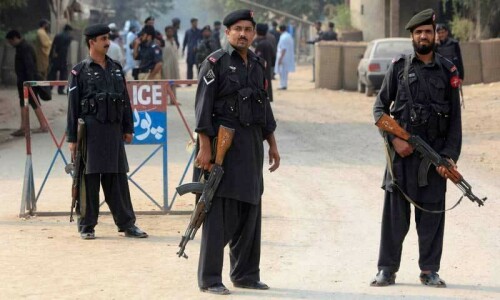PESHAWAR: The Peshawar High Court has rejected bail plea of an accused charged with double murder of his daughter-in-law and another person on pretext of honour in Swat district last year.
A single-member bench consisting of Justice Mohammad Naeem Anwar, while rejecting petition of Fazal Wahab, observed that sufficient direct and circumstantial evidence was available on record to show prima facie involvement of the petitioner in commission of the offence.
The bench observed that the offence fell within the restrictive clause of section 497 of the Code of Criminal Procedure (CrPC), therefore, the court was not inclined to release the petitioner on bail in the circumstances.
The bench observed that the postmortem reports of both the deceased persons were also in line with the version of prosecution according to which they had been murdered through firing.
Petitioner blamed for killing his daughter-in-law and a man in name of honour
The FIR of the occurrence was registered at Khurshid Khan Shaheed police station in Khwazakhela on May 16, 0222, and the relevant SHO was complainant in it.
SHO Shujaat Ali claimed that he received information regarding double murder of a woman and a man in Sholgara Shalpeen village and when he rushed to the spot, he found body of the deceased woman lying in the house of the accused. He stated that body of the male deceased was also lying near the residence of the petitioner.
The complainant stated that no one was ready to lodge report regarding the matter, however, police came to know that the deceased woman was daughter-in-law of the accused and he suspected that both the deceased persons were having illicit relations.
Subsequently, wife of the accused recorded her statement before a magistrate wherein she charged him for firing at the deceased woman in her presence inside their house.
Similarly, statements of two brothers of the deceased man were also recorded on May 24, 2022, according to which they had witnessed the accused firing at their brother.
During hearing of the petition, the husband of the deceased woman appeared along with his two sons and stated that the accused was his father and they did not want to contest his bail petition.
The petitioner’s counsel contended that the statements of the eyewitnesses had been recorded at a belated stage and could not be relied upon. He added that legal heirs of the deceased woman including her husband had no objection to release of the petitioner on bail.
The bench observed that keeping in view the nature of offence in the present case especially in the light of the customs and traditions prevailed in this area as well as mode and manner of the occurrence and report, delay in recording statements of eyewitnesses would not stamp them as false witnesses at that stage.
About compromise between legal heirs of the woman and the accused, the bench observed that compromise in such offences was subject to the conditions provided in section 345 (2) CrPC besides there was also a mandatory provision in section 311 of the Pakistan Penal Code (PPC) according to which if the offence had been committed in the name or pretext of honour, the imprisonment should not be less than 10 years.
Published in Dawn, February 6th, 2023














































Dear visitor, the comments section is undergoing an overhaul and will return soon.